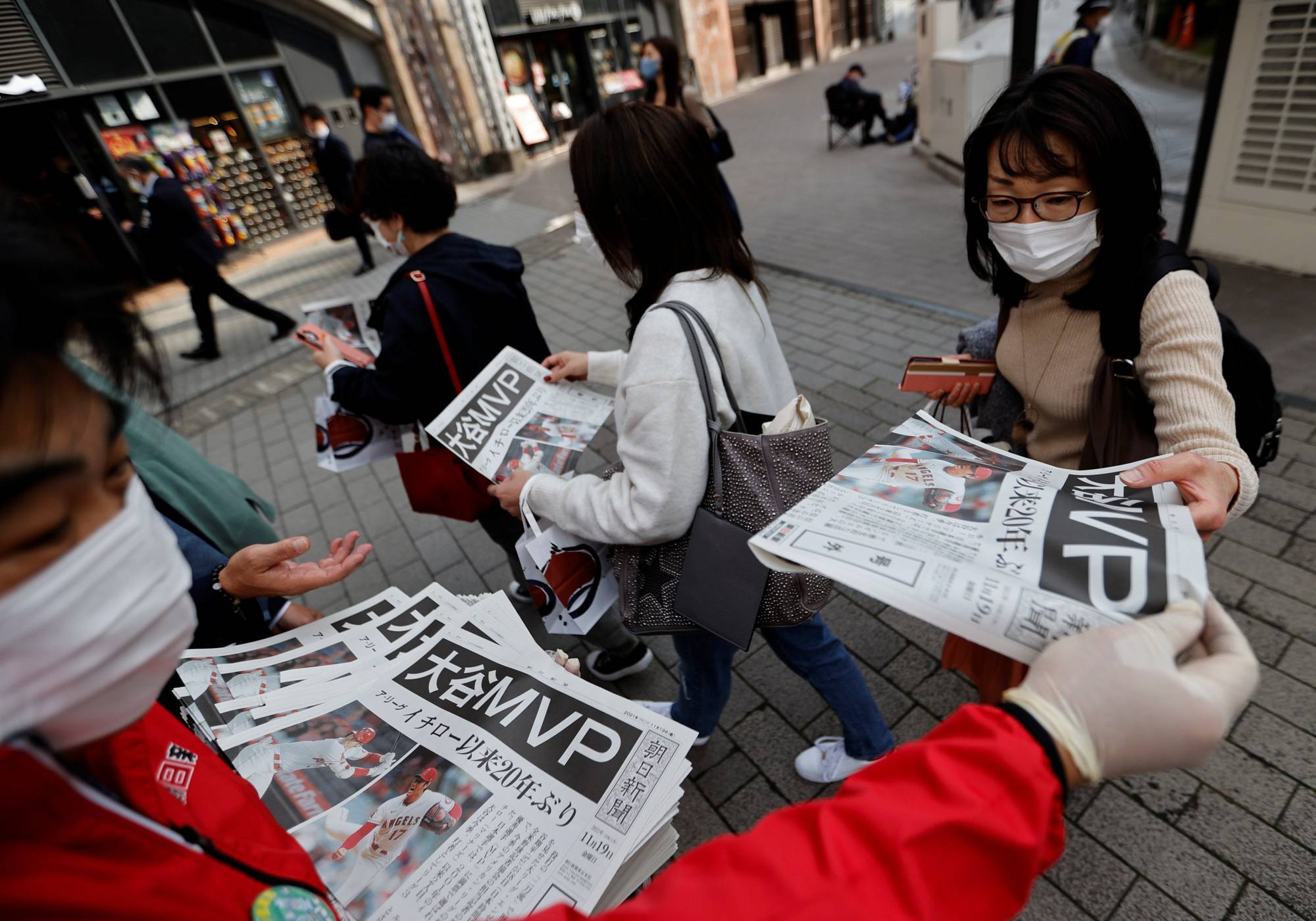Winning the American League’s Most Valuable Player Award on Thursday was the icing on the cake for Shohei Ohtani and his remarkable 2021 season, in which he achieved career heights as a hitter, hitting 46 home runs while starting 23 games for the Los Angeles Angels.
Ohtani’s unanimous selection made him, after Ichiro Suzuki in 2001, the second Japanese to win an MVP in the majors. And though Japan now celebrates Ohtani and Ichiro as national heroes, both only achieved that status after once being looked down on for the different way they wanted to play pro baseball.
Ichiro won three Pacific League MVP awards in Japan and seven straight batting titles, but that was only after he was shunned for two years by his first pro manager. Ichiro’s refusal as a teenager to alter his now-iconic batting style with its pendulum front-leg swing, consigned him to spending most of his first two pro seasons in the minors.
Unlike Ichiro, a fourth-round draft pick out of high school, Ohtani was a marquee prospect with a blazing fastball and a big athletic body that attracted the attention of scouts from the U.S. No one doubted he would succeed as a pitcher, but only a bizarre chain of circumstances — and his willpower — allowed Ohtani to be the two-way sensation he is today.
Upon being named AL MVP, Ohtani said his transition to the majors had been easier because “American fans, USA baseball, were more accepting, welcoming the whole two-way idea compared to when I first started in Japan.”
Being a two-way player, however, would not have been an option if Ohtani had turned pro with a U.S. team out of high school as he originally intended, or if he had entered NPB’s draft without mentioning his overseas ambitions.
That was because no team on either side of the Pacific was going to let a teenager with such electric pitching talent bat, unless they had to.

It was Ohtani’s desire to go his own way and turn pro overseas, that forced the PL’s Nippon Ham Fighters to come up with innovative ideas to sign him and keep him in Japan.
Allowing Ohtani to be a two-way player was part of that deal, and instantly marked the cheerful and diligent youngster as different. Like Ichiro’s unusual batting stance, Ohtani’s unflagging desire to both hit and pitch was perceived as a gimmick and something of an affront to the established order of Japanese pro baseball.
Although both players were amazingly talented at playing baseball, they also needed help from managers who encouraged them to develop those talents in their own way.
Ichiro was freed to do his thing in his third pro season with the Orix BlueWave when Hall of Fame manager Akira Ogi took over. After two years of destroying minor league pitching, Ichiro became a national hero. Ohtani, meanwhile, had the support from Day 1 of former Fighters skipper Hideki Kuriyama.
In an environment that supported their unique styles rather than discouraged them, both players flourished, although Ohtani had to constantly fight the urge to conform.
Vocal former players asserted year after year that Ohtani was being selfish and could only achieve his true potential as a hitter or a pitcher by focusing on one or the other. But he saw no upside in being something he wasn’t.

In February 2017, in spring camp in Okinawa as the reigning PL MVP, Ohtani said, “If I were to focus on one or the other, there’s no guarantee I would be better at it.”
When Ohtani went to the majors, there were no guarantees his team would encourage his hitting the way the Fighters had and the way the Angels eventually did.
Some teams, no doubt, only wanted to pay lip service to his desire to hit in order to acquire him as a hard-throwing power pitcher.
Even at the 2017 baseball winter meetings, soon after Ohtani signed with his club, then-Angels manager Mike Sciosia was cautious about Ohtani’s ability to produce as a designated hitter. Ohtani had to convince him and went on to win the AL Rookie of the Year Award largely because of his offense.
Like Ichiro, Ohtani is who he is because of his physical talent, but probably also in part to the personal drive necessary to develop a unique style in an environment that can look askance at those who appear to be different.
In a time of both misinformation and too much information, quality journalism is more crucial than ever.
By subscribing, you can help us get the story right.
Source : Baseball – The Japan Times